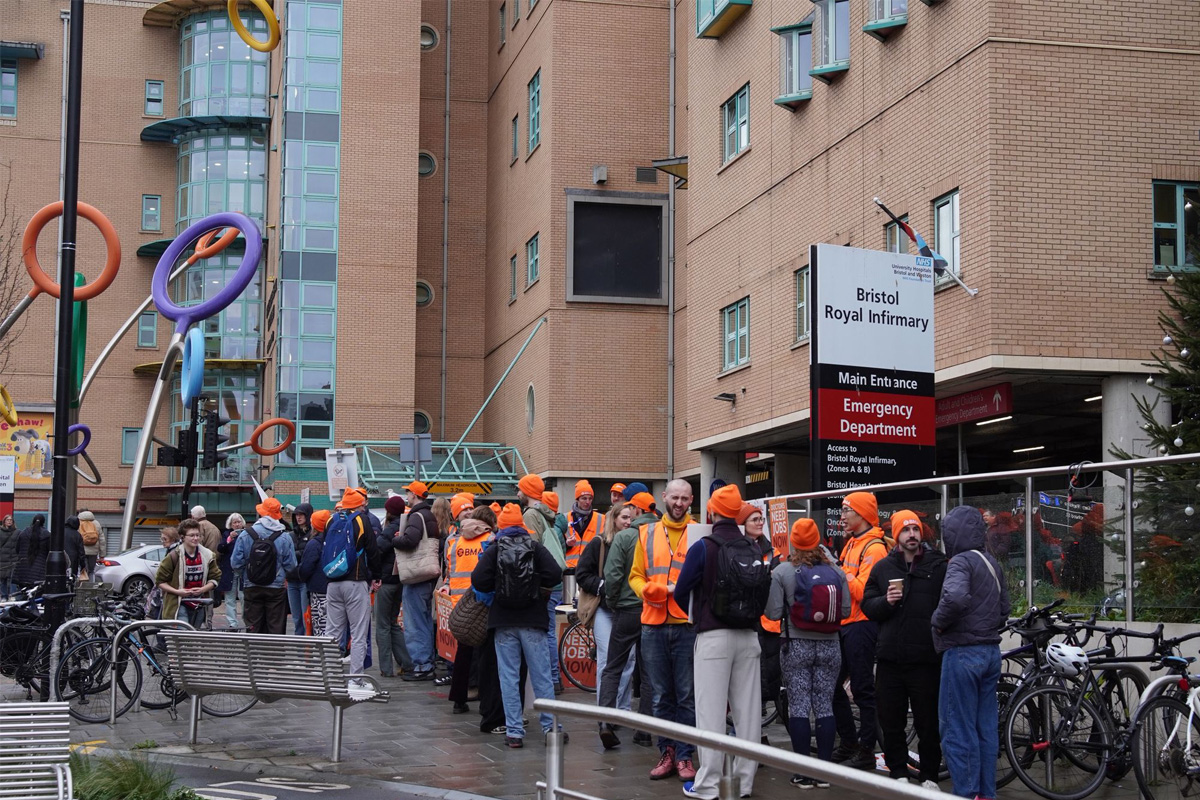Prompted by allegations of bullying and a “climate of fear” within the University Hospitals Birmingham (UHB) NHS Trust, the Bewick report has recently been released after months of delay.
Unsurprisingly, this review – the first of three commissioned to look into conditions at UHB – downplays any findings and offers little in the way of solutions.
One issue highlighted is the dangerous shortage of staff, which the report’s authors concede is a major concern. All four hospitals that the trust oversees have difficulties maintaining safe staffing levels. And the report admits that there is a correlation between this and poor patient outcomes.
On the brink

Earlier this year, Socialist Appeal activists in Birmingham visited the BMA pickets at Queen Elizabeth Hospital to speak with striking junior doctors about their conditions.
Health workers revealed that casualisation is endemic within UK hospitals, as the employers attempt to plug shortages by putting untrained apprentices onto the frontlines. These conditions are leading staff to leave the NHS for the private sector, or to move abroad to work.
The junior doctors spoke with a real passion about their commitment to a public health service that is fit for all. Many felt, however, that the NHS is only being propped up by workers’ personal sacrifices, and that it is only a matter of time before the whole system collapses.
Toxic culture
When attempting to highlight safety concerns at the trust, staff are quickly shot down. One worker, interviewed by the BBC, stated that they were “punished quite quickly and quite harshly”. Another revealed that: “If you criticise senior management, they’ll have you.”
The Bewick review details how: “Any continuance of a culture that is corrosively affecting morale and in particular threatens long-term staff recruitment and retention will put at risk the care of patients across the organisation.”
The report states that such a culture may affect staff morale and dampen recruitment, which in turn impacts upon patient safety. In terms of answers as to why this is the case, however, the report comes back empty handed.
This begs the question: where does this culture come from?
Some have claimed that this environment is a result of the high expectations put on the trust leadership, resulting from the fact that this is one of the largest health providers in the country. This pressure then trickles down into the ranks, the explanation goes, putting further stress on already-overworked staff.
Yet workers on the pickets were not convinced this was the full picture.
Toxic culture and poor leadership are symptoms of a deeper crisis. The real culprit is the austerity and privatisation that is depriving the NHS of the resources that staff and patients so desperately need. Consequently, health workers are being stretched to breaking point.
This is not an isolated case at a single NHS trust, but is prevalent across the entire health service.
Sticking plasters
The “overall view” of the investigation, however, is that “the trust is a safe place to receive care”. But this flies in the face of the facts. Public health in Britain is in a dire state. Evidence that UK life expectancy has flatlined is just one example of this.

The report ends with a few limited suggestions for further reviews, alongside recommendations for small tweaks to organisational structures. The trust has been more than happy to accept these conclusions, due to their limited scope.
The authors also suggest that a new leadership could potentially turn things around. But in reality, they would just inherit the same austerity-gutted system as their predecessors, leading to either a resurgence of all the old issues or the emergence of a crop of new ones.
Ultimately, the problems at UHB are longstanding, and are a symptom of a far deeper rot. Sticking plasters and changes of the guard will not suffice.
Struggle for socialism
To tackle the issues that plague the NHS, health workers must unite and fight for bold socialist policies. Rather than simply offering palliative care, as suggested by reports such as this, we must get to the root of the problem.
This means expropriating the banks and monopolies, in order to fully-fund and expand the NHS; reversing all privatisation and outsourcing of jobs and services; plugging staff shortages through a union-led mass recruitment campaign; and replacing hospital fat-cats and bureaucrats with democratic workers’ control.
Nurses and junior doctors are showing the way forward, organising militant action against the employers and the Tory government. To win, these struggles must be brought together, as part of a mass campaign of coordination action to kick out the Tories and kick out capitalism.
Only on this basis can we save our NHS, and provide the public health service that both patients and staff deserve.






